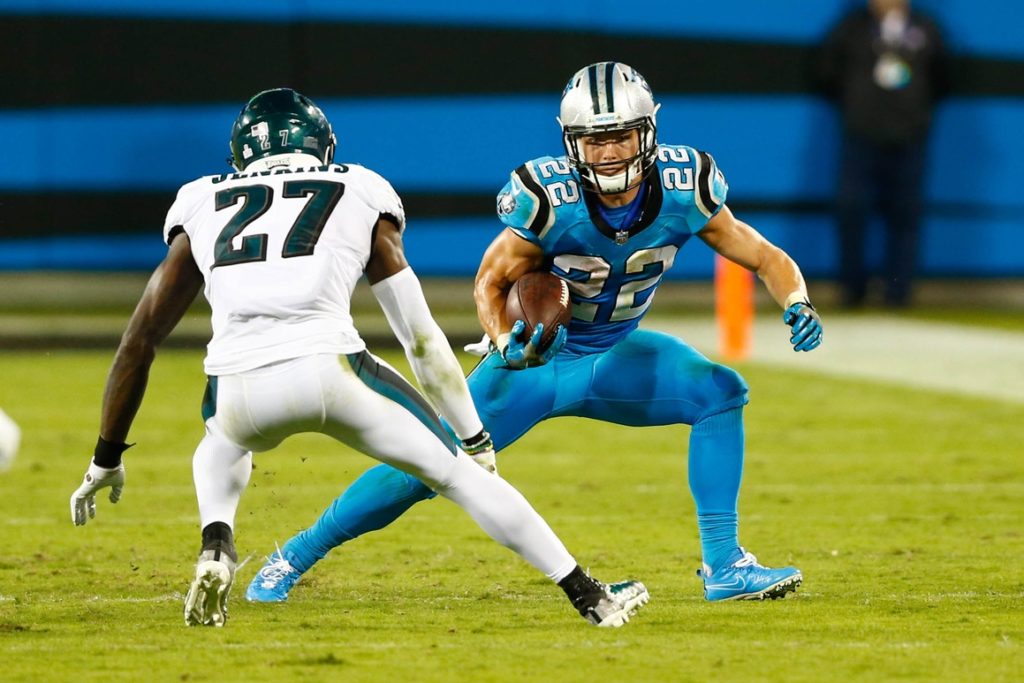Ad Disclosure
Have Defense, Will Travel
By Tim Reilly
Published:

With a win over the Carolina Panthers, the Eagles head into their mini-bye week with a 5-1 record. Undoubtedly, a number of narratives and storylines will emerge in the next few days from NFL pundits and journalists seeking to explain the Eagles’ success.
Allow me to add my own voice to the cacophony of the cognoscenti. If you want to understand why the Birds are currently sitting atop the NFC, look no further than the often competent, sometimes dominant play of its defense.
Heading into the season, the Eagles’ early slate appeared to be a daunting challenge for a young team fielding an inexperienced secondary. After opening the season in Washington against a team that had won five in a row against them, the Eagles were scheduled to fly to Kansas City to take on a tough Chiefs squad at Arrowhead, one of the NFL’s loudest stadiums. Philadelphia would then play their home opener against the New York Giants before flying across the country to take on Eagle-killer Philip Rivers and the San Diego Chargers. A home contest with the Arizona Cardinals and a road date against the Panthers on a short week rounded out the frame.
In August, a 3-3 record seemed like the best-case scenario for an Eagles team that limped to the 2016 finish line with a 1-7 record away from Lincoln Financial Field. How would the defense contend with Kirk Cousins, who has made a living in recent years carving up the Eagles’ secondary? Would they have any answers for Andy Reid’s creative offensive scheme? Could they slow down a pass-happy Giants team that was loaded with weapons at the wide receiver position? Would Rivers torch them like he did in 2013, when he threw for 419 yards and three touchdowns? Did the Eagles have a realistic chance of derailing the high-octane Cardinals offense? Could they contend with Cam Newton?
Once again, we learned that it is folly to look ahead in the NFL by looking back. The past is not always prologue, especially for a young team that has been developing an imposing defense.
The unit is led by coordinator Jim Schwartz, who has been granted the autonomy by head coach Doug Pederson to run the defense as he sees fit. Schwartz’s reputation for arrogance preceded him when he arrived in Philadelphia, and there were speculative rumblings in the media at the beginning of the season that he might have been undermining Pederson.
Notwithstanding the man’s real and perceived faults, Schwartz has proven himself an exceptional coach. Through six games, his defense has been fundamentally sound. They tackle well, swarm to the ball, pressure the quarterback, and maintain gap discipline (most of the time).
It all starts with the front seven, which is the strength of the unit. The Eagles boast a bevy of quality pass rushers in Chris Long, Brandon Graham, Vinny Curry, and Derek Barnett. Fletcher Cox and Tim Jernigan have dominated the interior. Meanwhile, the linebacking corps has benefited from the strong play of Nigel Bradham, Jordan Hicks, and the resurgent Mychal Kendricks.
The secondary is anchored by Malcolm Jenkins, a stalwart who has arguably been the most impactful free agent signing for this team since Terrell Owens. A safety with cover corner skills, Jenkins affords Schwartz flexibility in the design of his scheme. He shares the defensive backfield with Rasul Douglas and Jalen Mills, the former a rookie and the latter a seventh round pick in last year’s draft.
Douglas has been an aggressive, if occasionally overzealous, cornerback who drives on the ball very well. Mills, on the other hand, has exploited his extended playing time to narrow the gap between his ability and his seemingly limitless confidence. Both corners have acquitted themselves well in the absence of Ronald Darby.
The Panthers game serves as a microcosm of the defense’s stellar play this season. The Eagles’ second-ranked run defense stymied the Panthers, who ran for a total of 80 yards. All but nine of those yards were picked up by Cam Newton, who took advantage of the Eagles’ overpursuit on a red zone read option play to score an early touchdown.
The Panthers’ inability to establish a ground attack consistently put them behind the sticks and forced them to become one-dimensional. Newton was compelled to throw 52 passes, which is not a winning formula for a team that thrives on running the football.
Newton was pressured and hit frequently. Although he was only sacked twice, two of Newton’s three interceptions were the direct result of a pass rush bearing down on him.
The front seven’s penchant for generating consistent pressure eased the stress placed on the Eagles’ young secondary. Although Mills and Douglas were both asked to play in man coverage without safety help, they held their own. Deep routes did not have time to develop down the field. Newton was routinely forced to check down to Christian McCaffrey, who finished the game with 10 catches for 56 yards.
By keeping everything in front of them and rallying to the football, the Eagles defense limited the damage the Panthers could have inflicted. Bradham in particular was a tackling machine. His violent stop of Ed Dickson to prevent a first down in the third quarter was indicative of his overall performance.
Therein lies the recipe for the Eagles’ success away from home this season. They have routinely forced their opposition to throw the football in order to win. Furthermore, they have limited big plays, requiring offenses to methodically move the football down the field and execute 8-10 times in a row in order to score. So far, the strategy has paid dividends.
Defense. It wins championships. And road games, too.
Tim Reilly is a freelance writer from Northeast Philadelphia. He can be reached at reillyt7@gmail.com.